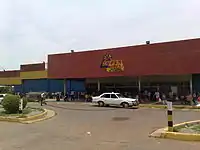Mission Mercal
Mission Mercal (officially launched on 24 April 2003) is a Bolivarian Mission established in Venezuela under the government of Hugo Chávez. The Mission involves a state-run company called Mercados de Alimentos, C.A. (MERCAL), which provides subsidised food and basic goods through a nationwide chain of stores. In 2010 Mercal was reported as having 16,600 outlets, "ranging from street-corner shops to huge warehouse stores," in addition to 6000 soup kitchens. Mercal employs 85,000 workers.[1]
| Missions of the Bolivarian Revolution of Venezuela |
|---|
| Food, Housing & Medicine |
| Education |
| Indigenous Rights, Land & Environment |
| Leaders |
Mission Mercal stores and cooperatives are mostly located in impoverished areas and sell generic-branded foods at discounts as great as 50%. While the company is heavily funded by the government, the goal is to become self-sufficient by replacing food imports with products from local farmers, small businesses, and cooperatives (many of whom have received microcredits from Mercal). This endogenous development is central to Chávez's stated goal of non-capitalistic development from the bottom up.
Recently, customers say that there are a lack of products in Mercal stores and that items available at these stores change constantly.[2] Some customers complained about rationing being enforced at Mercal stores due to the lack of products.[3]
Origins

The antecedent operations to Mission Mercal began operations following the economic hardships following the strike/lockout of 2002.[4] Up until that period, Venezuela's food production and distribution systems were primarily managed by large national corporations, a situation homologous to the present reality in Western nations such as the United States or Europe. As most corporations supported the strike/lockout, which was aimed at politically damaging Chávez, most of the food-related corporations joined the protests and ceased their operations. On 25 April 2003 broadcast of the television show Aló Presidente, Chávez expressed his outrage at Venezuela's lack of food sovereignty and the resultant vulnerability to the agenda of major food corporations, which was manifest in closed supermarkets, growing malnutrition, and food shortages. "This offensive served us a lot because we learned from the imperialism’s attack, from the Venezuelan oligarchy, and from those who were supporting the aggression against Venezuela and who would liked to have defeated us with hunger. [We learned] that we did not have a gram or a grain of anything, of food reserves. Before any natural, political or social disaster, Venezuela did not have then food reserves," Chávez stated.

Afterwards, in the depths of the oil shutdowns and general turmoil of 2002, Mission Mercal's reach expanded rapidly. The Armed Forces were integral in providing logistical support in moving, procuring, warehousing, and distributing food. Military bases and supply depots were used as food supply nodes, while military barracks became storage centers. Chávez acknowledged this by stating that "the army of Venezuela took to the street, gave of themselves and made the task easier with their technology, their human resources, their means of transportation and their installations for storing food". With initially only three Mercals (markets) and two warehouses, Mission Mercal (following its permanent and official inauguration in 2003) quickly multiplied to the point where 12,500 Mercalitos (mini-Mercals), 13,392 Mercals, hundreds of cooperatives, 31 Supermercals (mega markets), and 102 vast warehouses comprised a sprawling distribution system serving millions of barrio dwellers.
In 2006 some 11.36 million Venezuelans benefited from Mercal food programs on a regular basis. At least 14,208 Mission Mercal food distribution sites were spread throughout Venezuela, and 4,543 metric tons of food distributed each day.[5]
Food and discounts offered
Victuals offered by Mission Mercal include everything from meat and dairy (including powdered milk and cheese), to fresh produce, preserved foodstuffs, grains and cereals, fruits, vegetable oils, and mineral salts. These goods are offered in Mercal-affiliated establishments at discounts averaging between 25% to 50%.
Shortages
It has been reported that there are shortages in Mercal stores. Customers who wait in long lines for discounted products say that there were a lack of products in Mercal stores and that items available at the stores change constantly.[2] Some customers complained about rationing being enforced at Mercal stores due to the lack of products.[3] In some cases, protests have occurred due to the shortages in stores.[6]
References
- Business Week, 11 March 2010, A Food Fight for Hugo Chavez
- "En Mercal hay mucha cola para pocos productos". El TIempo. 1 May 2014. Archived from the original on 27 January 2016. Retrieved 7 May 2014.
- "Usuarios molestos por venta racionada de alimentos en Pdval y Mercal". El Carabobeno. 26 February 2014. Archived from the original on 8 May 2014. Retrieved 7 May 2014.
- "Chávez asegura que podría empuñar las armas para defender la revolución". El País (in Spanish). 28 January 2006. Retrieved 19 March 2009.
Ya estamos desarrollando e instalando un sistema integral pleno, nacional, de distribución de alimentos y de medicinas, para que no haya escasez
- "Datanálisis: Mercal es el lugar preferido para comprar alimentos". El Universal (in Spanish). 4 May 2006. Retrieved 19 March 2009.
- "#27M Protestan frente a Mercal de Patarata (Fotos)". El Impulso. 27 May 2014. Retrieved 28 May 2014.
External links
- Misión Mercal (in Spanish) — Official governmental portal for Mission Mercal.
- Mercal (in Spanish) — Official Mission Mercal factsheet.
- Mision Venezuela: Misión Mercal: Vía a la soberanía alimentaria (in Spanish) — A governmental site detailing Mission Mercal.
- Wagner, Sarah. (Venezuelanalysis, 24 Jun 2005). "Mercal: Reducing Poverty and Creating National Food Sovereignty in Venezuela". Retrieved 22 Oct 2005.
- Anna Isaacs; Basil Weiner; Grace Bell; Courtney Frantz & Katie Bowen (26 November 2009). "The Food Sovereignty Movement in Venezuela, Part 1". Venezuela Analysis. External link in
|work=(help)